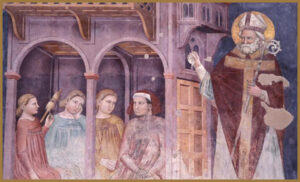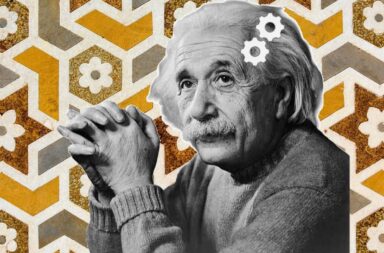Santa Claus, Saint Nick, Kris Kringle, or the last hope of any of us getting a PlayStation 5 this year. There are many ways in which you may have come to know Santa but, the chances are that you won’t know everything. For example, did you know that Papa Noël is the patron Saint of Amsterdam and Moscow? Or that his naughty and nice shtick was stolen from the legends of Odin and his two extremely judgemental ravens?
Yes, the King of Christmas is full of surprises, so it probably shouldn’t shock you to learn that the man from the North Pole is also autistic. Don’t believe me? Then keep on reading as, today, I want to discuss the cold hard proof of Santa’s autistic origin, as well as why this diagnosis could help you find the ultimate autism gift this Christmas.

Is Santa REALLY Autistic?
If you were to make a list of all things you associate with Father Christmas, the chances are ‘autism’ wouldn’t rank too highly. However, when you really think about it, can you say that the links you have made aren’t in themselves someway spectrum associated?
Take for example Santa’s routine of visiting all our homes at the exact same time of the exact same day every year. Or, how even in preparation for this event, Santa will line up his reindeers in the exact same order. Like In Bruges‘ existence as a criminally overlooked Christmas film, the signs have always been there and, when you consider that this is just the tip of the candy cane, it’s a surprise no one has noticed the other evidence sooner, such as:
- He always wears the same clothes – red and comfortable
- He has a strong sense of what is good and bad – and he’s constantly checking to make sure he’s right
- He avoids all social meetings – unless he has his grotto, where everything is accounted for
- He likes his own space – at the most remote part of the whole planet
- He has a limited diet – cookies and milk anyone?
Yet, even before Saint Nick became Santa, this holier than thou servant was already well on his way to neurodivergent status. I mean, the guy even had a clear as day special interest, in the form of The Book of Hours of Duke of Berry (something which he is rarely depicted without) and, when it comes to his most famous act: where he distributed all his wealth to those less fortunate, the A.S.D-dar goes off the scale as, on one hand, this demonstrates a strong moral compass and, on the other, it shows poor money management (which is also common in autists).
Admittedly, those last few points are a bit of a stretch. However, when the coincidences are mixed with the many facts, it’s hard to ignore Santa would at least warrant a minor observation.
This is great news though as, just like Rudolph’s red nose, Santa subsequently shines out as a sparkling example of what our community can achieve. Wherein, like many of the greats, his success isn’t a saintly miracle, but a team effort…

How an Autistic Santa Found Success:
Sure, when Christmas rolls around, it’s Santa’s analytical mind that plans the logistics for the eve’s adventures. However, the success of the season isn’t singlehandedly achieved but, in truth, a team effort – which the big man would credit to both his personal and professional family.
This is because, while we all know that autistic people are unconventional problem solvers, it’s often the case that we get so hooked on the ‘unconventional’ that many of us are ignored for the unique solutions we can express. For Santa though, this wasn’t quite the case as, when he posed the idea of things like entrance by chimney, he was listened to and respected – a decision which has paid off (as recent advances in home security seem to ignore this unconventional entry point).
Of course, not everyone on the spectrum is quite as fortunate and, throughout the year, many in our community are not given such an opportunity to dream big. This is a shame, as studies have shown that our community’s unique takes can, on average, lead to 40% faster solutions but, unless people are willing to listen, these perks mean diddly squat.
That’s not all we can learn from Santa’s support network though, as it’s incredible to consider just how much we have all learned to embrace Mr Clause’s quirks. We don’t see his differences as a problem, but something which makes him… him – and he is loved all the more for it.
But okay, okay, I get that this is a bit much for an article based around Father Christmas being autistic, yet it’s not so much that a simple change in mindset wouldn’t clear up any need for this development in the first place.
As such, why not take a leap from the Elves, Ms Clause and Santa himself this year and, moving forward, give the gift of autistic understanding to help those of us on the spectrum find success in our own way. All it takes is a positive mindset and a dash of belief to make a world of difference and, after all, if we can learn to believe in Santa then it’s high time we learn to believe in the autistic community and its potential.

Carry on the Conversation:
Will you be following the example set by Santa’s support network? Let me know in the comments below. And, if you would like to hear about further spectrum speculation, then why not check out this post: Was Winnie-the-Pooh Created to Raise Awareness of Autism?
As always, I can also be found on Twitter @AutismRevised, on Instagram @autisticandunapologetic and via my email: AutisticandUnapologetic@gmail.com.
If you like what you have seen on the site today, then show your support by liking the Autistic & Unapologetic Facebook page. Also, don’t forget to sign up to the Autistic & Unapologetic newsletter (found on the sidebar on laptops and underneath if you are reading this via mobile) where I share weekly updates as well as a fascinating fact I have found throughout the week.
Thank you for reading and I will see you next time for more thoughts from across the spectrum.


